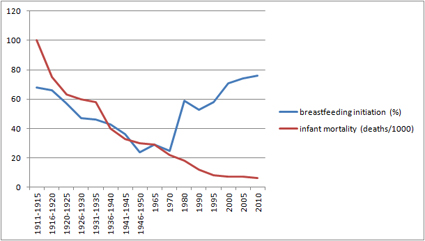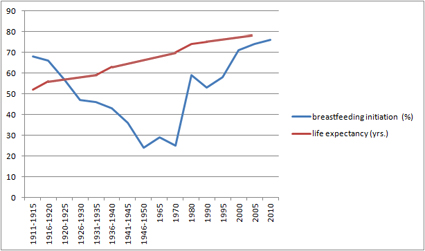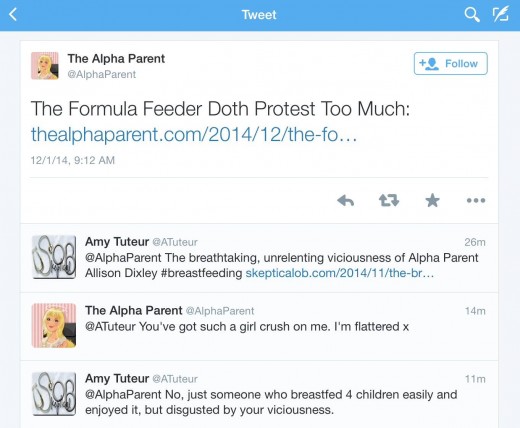On Friday I wrote about the breathtaking, unrelenting viciousness of Alpha Parent Allison Dixley’s new book Breast Intentions. True to form, Dixley doubles down on her own blog with today’s post, The Formula Feeder Doth Protest Too Much.
She starts off with the conceit of narcissists everywhere: if you aren’t cheering what she likes, you are treating it with contempt.
If you’re been alive for the fast five or so years, you may have noticed something peculiar: the emergence of a new zeitgeist of contempt for breastfeeding. Even a cursory look at the lifestyle section of many online newspapers reveals a contemporary back-catalogue now groaning under the weight of the collective bitching of a vocal minority of failed breastfeeders.
In this post I question the motives of these failed breastfeeders, let’s call them ‘formula apologists’ – the folk who make it their raison d’etre to criticise breastfeeding – that is, to criticise its promotion and its significance.
No, instead of questioning them, let’s take a look at the science. Although everything that Dixley writes rests on the premise that formula feeding harms babies, the evidence shows something very different.
I shared these graphs last year, and they make the case quite powerfully.
Over the past 100+ years US breastfeeding initiation rates have dropped precipitously and begun to rise again, but there appears to have been no impact on infant mortality, life expectancy or IQ. Sure breastfeeding provides benefits in industrialized countries, but those benefits are trivial.
So Dixley’s unrelenting viciousness toward women who can’t or don’t want to breastfeed rests on precisely NOTHING. It’s as though her entire blog were devoted to demonizing women who don’t buy the same type of car that she drives. She’s vicious because she is desperate to have her own choice mirrored back to her, not because her choice actually matters. And she utterly misrepresents that nature of the choice, the science behind breastfeeding, and the reasons why people oppose her.
It’s easy for her to go after women who chose to formula feed as trying to excuse their “failure” to breastfeed, but she can’t seem to account for the fact that someone like me, who easily and successfully breastfed four children would vociferously reject both her claims about breastfeeding and her vicious way of making them.
It’s hardly surprising that I don’t support Dixley, given my claims that lactivism, like most of natural parenting is not based on scientific evidence and that the emphasis on time intensive parenting that requires the presence of the mother 24/7/365 is retrograde and sexist. But then I got to thinking about who does support Dixley, and besides her followers who are equally desperate to have their own choices mirrored back to them, she is supported by … NO ONE.
With her message of the vital importance of breastfeeding to the health and well being of children, you might expect that she would garner the support of professional lactivists. I could find no evidence that Dixley’s stance is supported by any professional breastfeeding organizations, any lactivism programs, or, any major authors in the field whether they write for lay people or for other professionals.
Dixley’s new book, Breast Intentions, has no blurbs from other lactivists, pediatricians or public health experts. Thus far, a week after it has been published in the UK, the book has received no professional reviews. As of this morning, there hasn’t been a single positive comment on Amazon UK or Amazon.com.
It’s as if (to appropriate the crude language of Dixley herself) the book is like “a fart trapped in an the elevator,” a repulsive eruption of which everyone is doing their best to ignore, in the hope that it will simply fade away.
When considering Dixley’s writing, both on her blog and in her book, readers would do well to keep in mind that her opinions are her own and are not supported by any breastfeeding organizations, lactivism programs or healthcare professionals. If professional lactivists shun Dixley and her viciousness, and they do, everyone else should, too.






